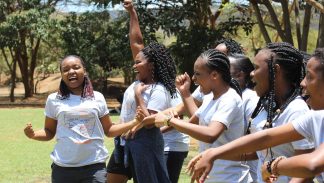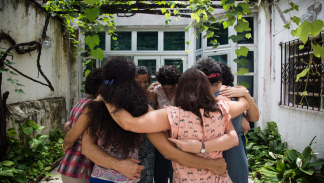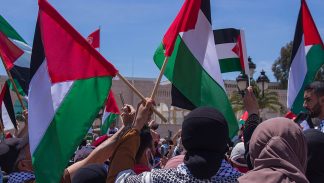Sri Lanka at a Crossroads
Update Nov. 18, 2019: Strongman candidate Gotabaya Rajapaksa was declared president-elect on November 17, 2019. Global Fund for Women stands with Sri Lanka, and especially with our grantee partners, as they continue their work seeking peace and justice for all Sri Lankans.
Sri Lanka is at a crossroads. On November 16th, 2019, the people of this South Asian island nation will choose a new President, and in doing so, change the course of the future of human rights and gender equality in the country.
It’s been ten years since Sri Lanka’s brutal civil war ended. During the war, tens of thousands of civilians were killed, and the Sri Lankan government escalated the torture, rape, detention, and abuse of ethnic minorities—all overseen by former President Mahinda Rajapakse. Those who spoke out for human rights—including activists, journalists, and community organizers—were ruthlessly silenced through assassinations and disappearances.
During his presidency, Rajapakse’s government operated on cronyism and authoritarianism. He removed the two-term limit for the presidency and appointed his brothers to key government positions. But what Rajapakse did not count on was the resilience of the Sri Lankan people’s spirit. Banding together across ethnicities and religions, with women and minorities at the forefront of organizing, Sri Lankans voted out Rajapakse in 2015 in what was a shocking defeat.
In October 2018, the former President helped engineer a coup in an attempt to return to power, but democratic structures – from a more impartial court to mass public mobilizing – supported by civil society stood the test, and the coup failed.
Then, in April 2019, a coordinated series of bomb attacks ripped through Sri Lanka’s fragile peace. The Easter Bombings unleashed a wave of violent retaliation against Muslim communities and led to the resurgence of crackdowns on civil society groups. Strongmen candidates are whipping up the lingering unease as they campaign for the upcoming Presidential elections. Among the frontrunners is a familiar name: Gotabaya Rajapakse. The brother of the former President, and the former Secretary of Defense, Gotabaya Rajapakse is promising to return Sri Lanka to militarized state of emergency and create a ‘disciplined’ civil society.
A WAY TOWARD HOPE, WITH WOMEN LEADING THE CHANGE
Now, women’s groups are mobilizing to ensure a way forward for peace and justice. Seizing the window of opportunity offered by the last four years, women’s groups have been laying down a firm foundation for human rights. Their leadership during this time has led to important gains: Mothers of the disappeared organized sit-ins that influenced the government to establish an Office of Missing Persons. Women advocated for, and won, a 25% quota of all political seats legally reserved for female candidates. Internally displaced women led occupation strategies that pressured the military to return over 46,000 acres of ancestral lands.
Global Fund for Women’s grantee partners set their sights on a particularly important area of change: supporting the healing of survivors of conflict- and gender-based violence and ensuring that their voices are heard in the decisions that affect their lives.
In Amparai District, for example, which has a long history of militarized violence, Affected Women’s Forum (AWF) is mobilizing women into community groups. Starting with one group of 15 women in 1996, their networks now reach over 3,000 women whose lives have been disrupted by violence. “(Under the Rajapakses), we focused our activities on healing,” says Vanie Simon, Co-Director of AWF. “We couldn’t ask women to speak out because of the risks. There was a lot of fear. So we found other ways to support them individually. But now there is the opportunity to go further. Now we have the chance to take back our rights.”
And so they are. With the support of AWF, women in Amparai are mobilizing for the rights of the disappeared. They are working with the police, schools, and local hospitals, to create sensitive support systems for survivors. And they are running for office.
Similarly, VILUTHU works in Jaffna District, an area impacted by the conflict that continues to be militarized today. They, like AWF, demonstrate how much resilience lies in Sri Lankan women’s spirits. A young woman whose husband was shot and killed by the Sri Lankan Navy when she was 18, for example, started a network of women whose husbands were forcibly “disappeared” during the war. Today, with the support of VILUTHU, the network has over 4,000 members who are advocating for the rights of female heads of households.
And no matter how painful the loss, women recognize that that the war did not only hurt their community. Sharing experiences across ethnic lines with compassion and honesty can help overcome political divisions and build the relationships that allow peace to take root. Women’s Resource Center uses this approach for reconciliation at the local level. They bring women from Tamil communities whose husbands were forcibly disappeared during the war together with women from Sinhalese communities whose husbands were killed fighting as soldiers. Their shared experience – as women and as widows– is helping to heal the scars of war.
Wherever Sri Lanka’s transitional justice process has lagged, it is Sri Lankan women like these who courageously organize to push human rights forward.
PROGRESS OR ROLLBACKS: A CRITICAL ELECTION
The upcoming elections will decide if the progress made after the war will carry forward. But civil society groups succeeded in speaking out for human rights during the Presidential elections in 2015. And now, they have four years of preparation and hard work behind them that have raised a powerful force of women and their allies all speaking out together for their rights. From courageous grassroots networks of survivors, to women holding newly forged seats of decision-making, to the official bodies they helped establish to offer justice, women are ready to meet whatever comes.
“We will continue to do this work,” says Shyamala Gomez, Director of Center for Equality and Justice. “There is resilience in survivors. We need to encourage that. It’s very important to us. We work together to mobilize for strength in numbers.”
Mariyahl Hoole is Global Fund for Women’s Strategic Content Development Officer. She worked as a peace activist during Sri Lanka’s civil war and afterwards, with communities of survivors.
There was a high surveillance of women’s groups. […] Every one of us had to watch out for our survival, and watch our backs.”Shreen Saroor, Woman Human Rights Defender


